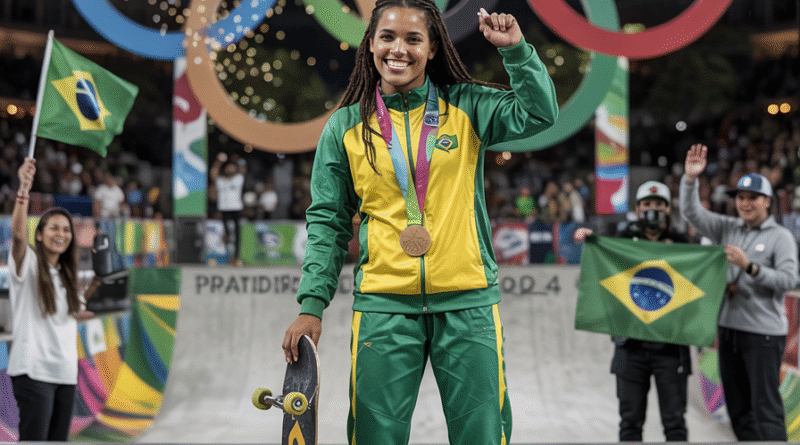Rayssa Leal Wins Second Olympic Medal and Becomes Brazil’s Youngest Two-Time Olympic Medalist
At just 16 years old, Brazilian skateboarder Rayssa Leal has once again captivated the world by winning her second Olympic medal at the Paris 2024 Olympic Games. With a composed and confident performance in the women’s street final, she secured a bronze medal, adding to the silver she claimed in Tokyo 2020.
With this result, Rayssa has officially become the youngest Brazilian athlete to win two Olympic medals, rewriting the country’s sports history and further cementing her place as a national icon.
From Viral Video to Olympic Podiums
Rayssa’s journey from “Fadinha do Skate” (Little Fairy of Skate) — a nickname she earned after going viral as a 7-year-old doing tricks in a fairy costume — to double Olympic medalist is nothing short of extraordinary.
Her story is a testament to natural talent, hard work, and emotional maturity well beyond her years. In Paris, she faced tough competition from Japan and the United States but delivered consistent runs filled with precision, creativity, and flair.
Her final trick — a frontside feeble grind on the highest rail — secured her place on the podium, prompting tears of joy and chants of “Rayssa! Rayssa!” from the Brazilian fans in the stands.
Consistency, Pressure, and Poise
What sets Rayssa apart isn’t just her technical skills, but her ability to handle pressure in high-stakes environments. At an age when most athletes are just entering senior competitions, she is already a two-time Olympic medalist.
Her coaches praised her calm demeanor and sharp focus throughout the qualifiers and final. “She’s become a leader in the sport while still being a teenager. Her future is limitless,” said Brazil’s skateboarding coordinator after the final.
In post-event interviews, Rayssa remained humble, thanking her family, team, and Brazilian supporters. “It’s not just about winning medals — it’s about doing what I love and inspiring others,” she said.
A Symbol of Brazil’s Urban Sports Revolution
Rayssa’s rise mirrors the broader growth of skateboarding and other urban sports in Brazil. Since the sport’s Olympic debut in Tokyo, Brazil has invested significantly in skateparks, youth programs, and athlete development.
With her success, Rayssa has become the face of that movement — influencing a generation of kids, especially girls, to pick up skateboards and dream of greatness.
Municipal governments in cities like São Paulo, Rio de Janeiro, and her hometown of Imperatriz (Maranhão) have already announced plans to expand local skate facilities following her Paris performance.
The Cultural and Social Impact
Rayssa’s story also carries weight beyond sport. As a young, Black, female athlete from a modest background in northeastern Brazil, her visibility and voice matter.
She has spoken openly about inclusion, representation, and the importance of making sport accessible to all. Her presence on the Olympic stage challenges stereotypes and reshapes expectations about who can become a champion.
Social media exploded after her bronze, with messages from athletes, celebrities, and political figures praising her maturity and legacy. Campaigns celebrating her journey now extend into schools and cultural institutions.
What’s Next for Rayssa?
Despite her already impressive career, Rayssa’s journey is just beginning. She has her sights set on the World Skateboarding Championships, the 2026 Youth Olympics, and, of course, Los Angeles 2028.
Her team is focused on balancing competition, education, and long-term athlete development. Meanwhile, major brands continue to partner with her, seeing her not only as a star athlete but a global youth icon.
As she continues to grow both personally and professionally, one thing is certain: Rayssa Leal is not just the future of Brazilian sport — she’s already shaping its present.
Conclusion: A Legacy in the Making
With two Olympic medals by age 16, Rayssa Leal has achieved what few athletes ever will. Her success in Paris confirms her elite status in global skateboarding and positions her as a lasting symbol of possibility, joy, and transformation in Brazilian sport.
And this is likely just the beginning.
